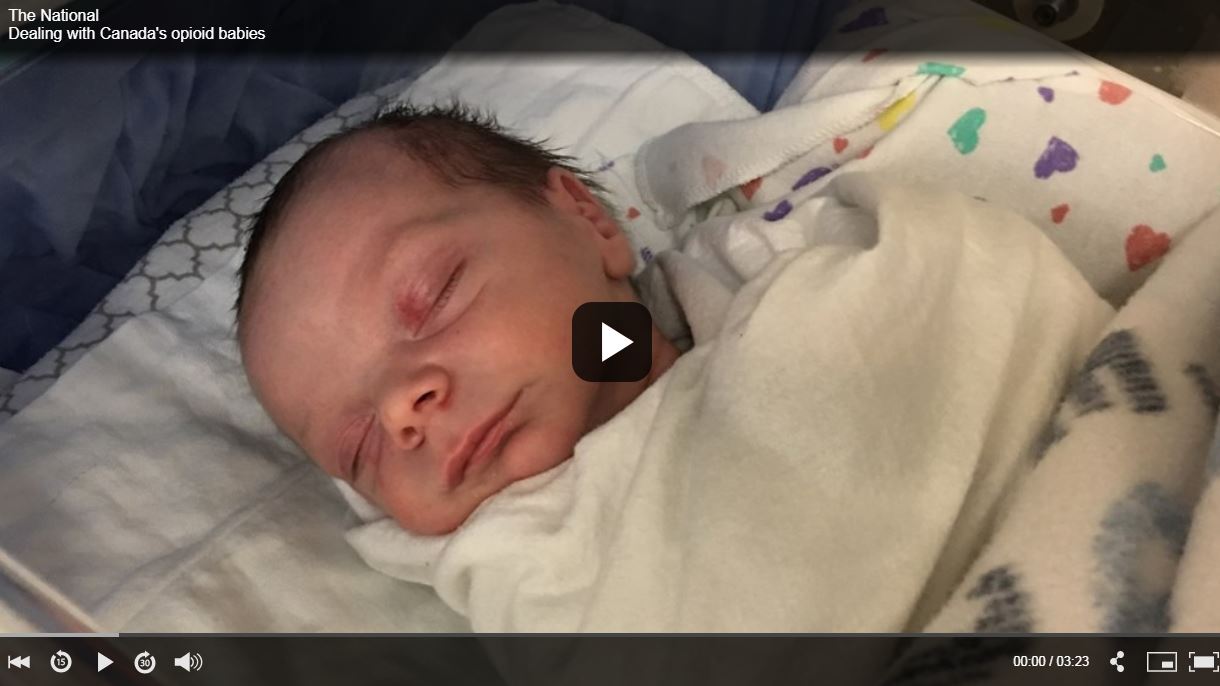How moms and babies rooming together can help combat opioid dependency
Article/Photos: CBC The National | Reporter: Kas Roussy, CBC News | Nov 01, 2018
More and more hospitals are turning to 'rooming-in' approach for substance-exposed newborns
Kobie is having none of it. The baby boy, dressed in a tiny Batman onesie, is squirming and screeching in his playpen —but they're happy sounds. "It's not playtime, it's naptime," says his mother, Christina Casey.
But she'll allow this display of defiance from her nine-month-old.
"He's amazing," she said. "He's developing good. He's talking like crazy. He says things like mama, bubba, nana."
There's reason for Casey to be grateful.
We first met Casey last January, just after Kobie was born at St. Joseph's Healthcare in Hamilton. She had left behind a life on the streets that included illicit opioid use and an abusive boyfriend.
"I was probably doing quite a few pills in a day, 'cause you would crush them and sniff them," she said. "I was doing about maybe 10 a day, or more. I was pretty messed up; I wasn't myself, that's for sure."
During her pregnancy, Casey was enrolled in a methadone treatment program, which is used to treat opioid dependence and to reduce withdrawal symptoms.
Kobie was exposed to the methadone while in his mother's womb. Within the first few days of his life, the newborn himself was experiencing withdrawal symptoms.
"Kobie had quite a high-pitch cry," recalls Sarah Simpson, a social worker in the hospital's women's and infants' program. "He was not settling easily at all. His temperature was higher than it should have been. He was quite jittery.
"He had what we call increased tone, which means he was quite tense and he was not feeding well. And I believe that happened for Kobie on Day 2 of life."
Kobie had neonatal abstinence syndrome (NAS). About 1,850 babies in Canada were born with the condition in 2016-2017, according to the Canadian Institute for Health Information, which represents a jump of 27 per cent over 2012-2013.
Casey said she felt "horrible" about what her newborn went through. "At the same time, there was nothing I could do," she said.
Avoiding separation
Kobie's withdrawal symptoms were treated in hospital: He was gradually weaned off the methadone with tiny doses of morphine. Treating one opioid with another sounds counterintuitive, but it is standard practice.
"Morphine is the medication that is the standard for treating any kind of opioid that mom has been taking during the pregnancy. That is the best medication to help baby get opioid out of the system," said Simpson.
And to make sure he had the best chance at a healthy life, Kobie spent most of his two-week hospital stay alone with his mother, bonding in a room of their own, away from the noises of a busy neonatal intensive care unit.
This so-called rooming-in initiative for substance-exposed infants was pioneered in 2003 at the BC Women's Hospital in Vancouver. It has since spread to more than half of all neonatal units across Canada.
Keeping these newborns with their mothers, as opposed to whisking them away for treatment in the NICU, encourages early bonding and attachment, allowing for breastfeeding and regular skin-to-skin contact.
"There is a fentanyl crisis happening," said program co-founder Dr. Ron Abrahams. "That really illustrates how important it is to address this crisis — not by separating the mothers and babies, but by supporting them and their journey back into the communities with their babies."
The rooming-in approach has also caught on in the U.S., he said, a country that, up until a few years ago, would criminalize pregnant women and new mothers for substance abuse, in some cases jailing them.
"We've turned that around, so that now mothers and babies are supported in many centres in the States," said Abrahams.
The Canadian Paediatric Society also endorses the practice; the group released a guidance document earlier this year advising that babies with NAS and their mothers should room together in hospital whenever possible.
Continued support through checkups
A key part of the initiative at St. Joseph's is the medical checkups; the first comes at two months, followed by appointments at four, six, 12 and 18 months.
Babies born exposed to opioids have a higher risk of developmental delays. So at his two-month checkup, Kobie was put through some simple tasks to check his cognitive and motor skills. He was also weighed and measured. He was right on track.
Now, at nine months, Casey and Kobie have settled into a new apartment; there's a huge park and a school across the street. Casey said it has been tough having to cut some people out of her life; she has good friends who are still using.
But she's looking to the future: Her methadone treatment program should be done by the new year. She also wants to finish her high school education.
And while there's always a risk that babies born with substance exposure, like Kobie, may experience developmental delays as they continue to grow, his mother chooses to focus on the healthy, happy child she has now.





